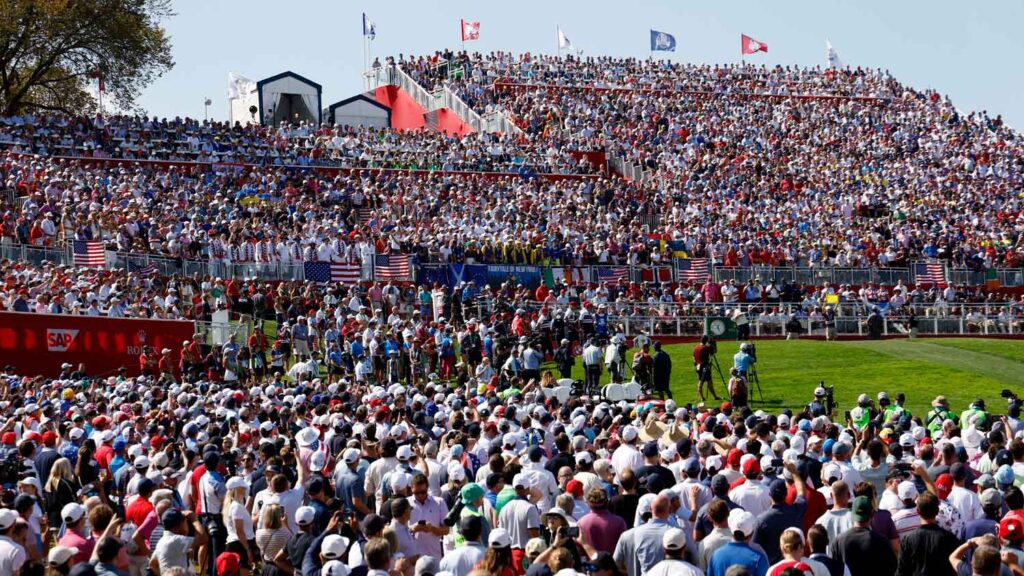The Best and Worst of Golf: Reflections on the Ryder Cup and Future Events
The Ryder Cup, one of golf’s most esteemed tournaments, often evokes both pride and nostalgia for its historical moments. Events like Tom Watson’s stellar performance at Turnberry in 1977, Jack Nicklaus defying age at Augusta in 1986, and Tiger Woods’ monumental 15-shot victory at St. Andrews are forever etched in the sport’s rich tapestry. However, not all moments are celebrated. The recent Ryder Cup held at Bethpage in 2025 has become infamous for far less honorable reasons. The negative fan behavior overshadowed the tournament’s spirit, prompting reflections on how golf can maintain its inherent values and promote a respectful environment.
Tom Watson, a legend in American golf, expressed his shame over the events surrounding the Ryder Cup. His apology was emblematic of a bigger issue: the growing trend of poor sportsmanship and disrespect at golf events. The inappropriate behavior from some American fans, including crude chants and the disrespect shown towards players and their families, tarnished not only the experience for those in attendance but also the overall reputation of the sport. Observers noted an alarming similarity between the scene at Bethpage and instances of disorder often associated with other sports, highlighting a dissonance in how golf is traditionally perceived.
In discussing the missteps of the Ryder Cup in 2025, one can’t overlook the implications for future golf tournaments. The PGA Championship, scheduled for 2026 in Philadelphia’s Aronimink, presents a crucial opportunity for the PGA of America to regain focus on golf’s core values. Events need to emphasize not just competitive spirit but also decorum and respect. Fans should be encouraged to embody the sport’s manners, creating an atmosphere that celebrates good behavior and sportsmanship just as much as the athletic competition itself.
Interestingly, the behavior observed during the Ryder Cup contrasts sharply with the generally mannerly golf culture. Competitions like the British Open or the Walker Cup uphold courtesy among players and fans alike. They remind us of golf’s historical roots, where etiquette played a foundational role. The PGA Championship must seize this chance to remind golf enthusiasts of the importance of respect and proper conduct, all integral elements that help define the sport’s enduring appeal.
Efforts to reshape fan conduct at the Ryder Cup and other events could entail stricter regulations against disruptive behaviors. A comprehensive plan can be instituted to ensure crowd control, including protocols that allow for swift action against offenders. Such measures are essential in curbing antisocial behavior and reassuring players and attendees that their experiences will not be marred by unruly fans. Combined with education on appropriate conduct, these initiatives can foster a respectful atmosphere.
Reflections from previous Ryder Cups reveal a trajectory that has devolved into an increasingly chaotic experience for players and patrons alike. The camaraderie that once defined these prestigious events is at risk of being overshadowed by a chaotic environment. Players like Collin Morikawa recognized the excitement of competition, yet they must also understand that chaos in the stands detracts from the game’s focus.
Importantly, the role of fans cannot be overstated. A vast majority attend golf events with sincere appreciation for the sport. They navigate logistical challenges and crowds to support their players, only to be confronted with disruptive behavior that spoils the experience. It’s imperative that golf administrators recognize the need for enriching the viewing experience, allowing fans to genuinely connect with the tournament without the interference of unruliness.
Looking forward, initiatives such as recognizing exemplary conduct among golfers could encourage respect within the sport. Establishing awards, akin to the Nicklaus-Jacklin Concession Award, can foster a culture of admiration for sportsmanship. Highlighting these values at event ceremonies adds a level of gravitas that reinforces the importance of integrity in golf.
Ultimately, the future of golf hinges on its ability to adapt and evolve while maintaining the principles that make the sport unique. The Ryder Cup’s infamous 2025 iteration serves as a reminder that golf is not just about wins and losses but also about community, manners, and respect among its players and fans. By addressing and correcting unwanted behaviors, golf can ensure that future events not only pay homage to the game’s storied past but also uphold the dignity it deserves.
In summary, as golf navigates its path forward, particularly in upcoming events like the 2026 PGA Championship, there’s a significant opportunity to reshape the culture surrounding it. By emphasizing respect, community, and sportsmanship, golf can continue to be a revered sport where everyone can celebrate the game without fear of incivility. It’s time for all involved—players, fans, and organizers—to recommit to the values that make golf a deeply respected and enjoyed sport worldwide.


